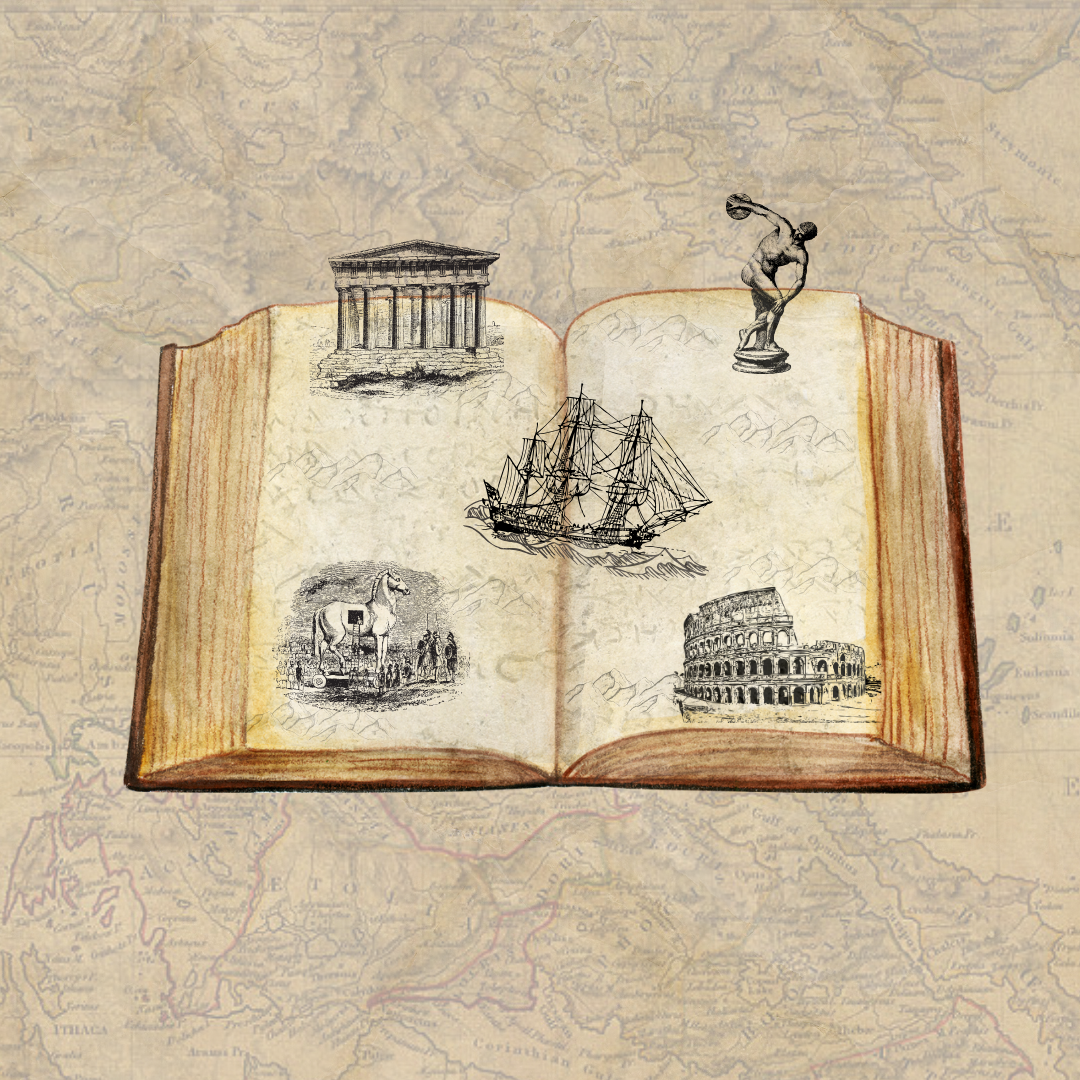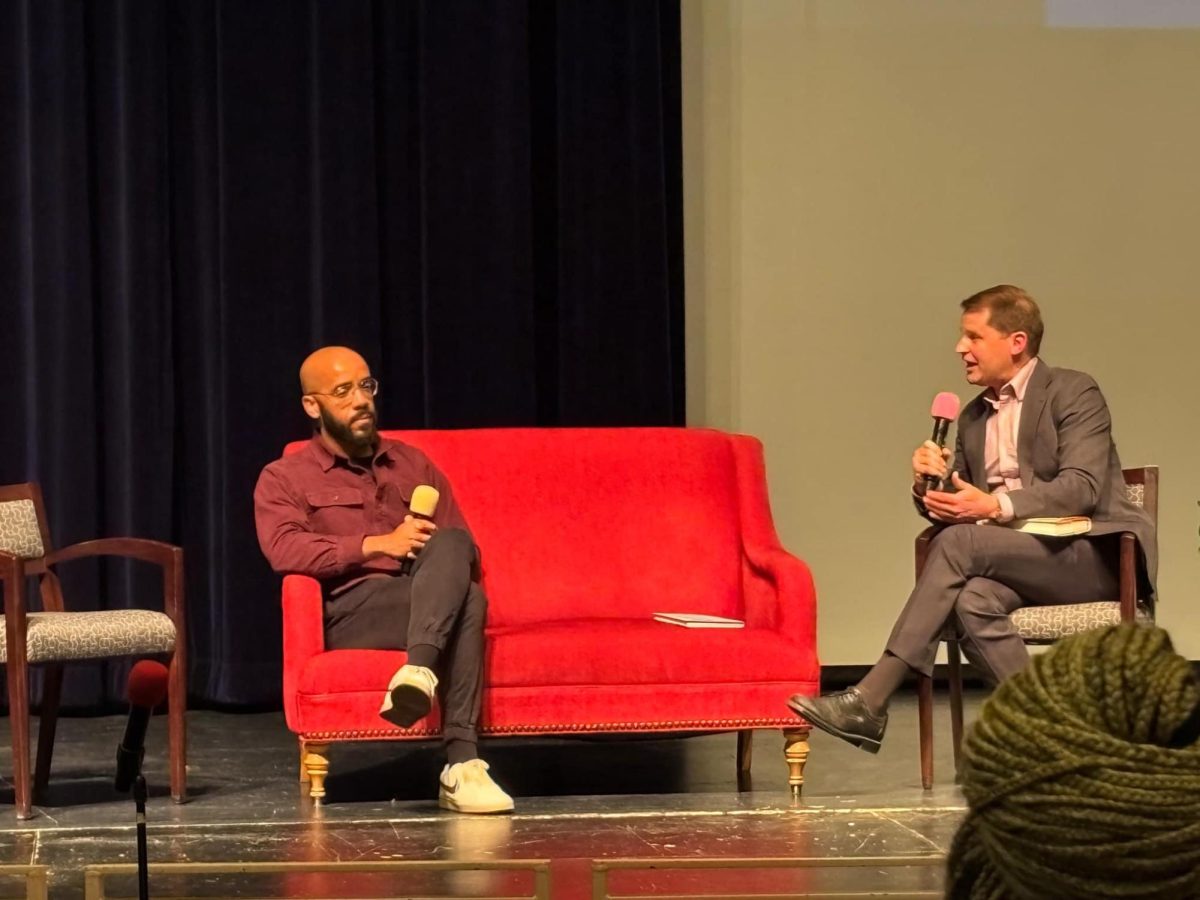On the dense pages of Homer’s legendary epics, swords collide, wars rage, lovers unite, cyclops brawl, deaths ensue and the gods intervene in everyday life. In his foundational literary dyad, “The Iliad” and “The Odyssey,” Homer describes an eccentric series of events, ultimately changing the landscape of future literature forever. But today, students are rarely able to read his original Ancient Greek correspondence and instead study versions translated and interpreted by linguistic experts, most of whom are men.
“The Odyssey” is a staple of the Whitman Honors English 10 courses, particularly in the “Stories in the Oral Tradition” unit. Throughout the unit, students dissect aspects of various classic texts to engage with the powerful storytelling behind epic and dramatized poetry, allowing students to analyze how these stories persist in contemporary culture.
Aside from its historical significance, English teacher Matthew Bruneel chooses to teach “The Odyssey” because he believes its complexities make it an exceptional piece of literature.
“Beyond the many cultural references and its role in the literary canon of Western culture, it’s still a really good book with an inventive style of writing and organization,” Bruneel said. “The moments of stress and problem-solving the characters go through are really entertaining, and the flaws and deep controversies that go along with the book are worth talking about.”
“The Odyssey” is a sequel to its sister text, “The Iliad,” also written by Homer. “The Iliad” chronicles the bitter war between the Greeks and Trojans through the experiences of the Greek warrior Achilles. The sweeping war story contrasts “The Odyssey,” which, through an all-knowing narrator, details the story of a Trojan War survivor, Odysseus, wandering through the last six weeks of his restless decade-long journey home.
These stories were read aloud in ancient Greek before Homer transcribed them around 700 BC. Before 2017, all recorded English translations of “The Iliad” and “The Odyssey” — which schools have taught for nearly 4,000 years — were exclusively translated by men, including Robert Fagles’ translation, the version MCPS teaches.
In 2017, British-American classicist and translator Emily Wilson published her rendering of “The Odyssey,” making her the first woman to release an English translation of the epic. In late October 2023, she also published her translated version of “The Iliad.” The goal was to create more accessible versions of the poems by translating them into contemporary English. She has also corrected previous “unexamined biases” by specifying which characters are enslaved and removing derogatory terms like “bitch” and “whore” in places where she believes they weren’t originally written.
Bruneel finds Wilson’s straightforward interpretation of the epic enjoyable and constructive for reader accessibility and understanding.
“I loved it because I got really used to the Fagles translation, and so seeing all the scenes again, but through different words, really snapped some of them into focus that I had never really been able to see before,” Bruneel said. “The accessibility to the characters in her language made them feel even more present and recognizable.”
Wilson’s translation, however, has garnered controversy and even disdain among readers, with some claiming that her work is overpraised because of her gender and others remarking that her translations are not intellectually serious. In the Atlantic’s article entitled “What Emily Wilson’s Iliad Misses,” author Graeme Wood disapproved of her direct approach to the epic’s wording, claiming that making the characters speak like modern men and women reduces their historical substance. He also refuted scholarly prestige and praise of Wilson’s translation, saying, “[s]ome readers expecting Disney will find themselves ankle-deep in viscera.”
Wood further attempted to mitigate the novelty of Wilson’s previous work, “The Odyssey,” by claiming that “women have been translating Homer for centuries.” Wilson is not the first woman to translate “The Odyssey,” as she pointed out many times. The notability of her accomplishment comes from being the first woman to translate it into English. Nonetheless, some see Wilson’s position as the “first woman” to perpetuate the notion that a person’s work may be entirely characterized by their gender.
Linda Leslie, an English and Women’s Studies teacher, wasn’t surprised by the criticism Wilson received for her work.
“Considering [the classic literature field of study] is a community that’s so entrenched in antiquity and is traditionally male, I don’t find it at all surprising that they’re going to look down their noses at a non-traditional translator or a translator who shifts the focus to away from the classic male hero,” Leslie said.
The brash gender-based comments against Wilson’s translation made Bruneel wonder if these critics even read the book. He didn’t think Wilson intended to undermine the patriarchy; instead, he viewed the fresh quality of her rendition as more effectual than her gender, he said.
Wilson’s translations cultivated conversation concerning the underlying misogyny of her criticisms. Some viewed these critiques as the familiar weapons often used by critics to undermine the work of those who have broken the glass ceiling, as well as a wrongful display that one’s gender determines their work’s significance.
Comments degrading the prestige of Wilson’s work present the idea that a woman can never compete with men because no matter their achievement it will still be less impressive. Although Wilson broke a crucial barrier, she didn’t receive as much respect because her gender became a factor in her translation’s excellence.
To Leslie, if someone possesses characteristics that differ from those that dominate their creative space, they’ll likely receive comments that reduce the quality of their work in the public eye.
“You’re always going to be accused that you’re not there because of your merit — you’re there because you’re a woman,” Leslie said. “If we were in a situation of true parity, people would say, tell me about the translation; tell me about the skills; tell me about your background. They wouldn’t be focused at all on the identity of the person.”
In another attempt to spoil Wilson’s work, critics on social media — some who admitted to not having read Wilson’s books — called her translations “Woke Homer.” The term “woke” is derived from African-American Vernacular English and indicates an awareness of social inequalities such as racial justice, sexism and LGBTQ+ rights. However, some use “woke” to disparage those who promote progressive ideas. People who didn’t read either of Wilson’s translations and only see a female author credited ultimately assume that her translations are inaccurate and progressive, detracting from the caliber of her work.
Those who view Wilson’s new translations as progressive fear that she also deviates too far from the classic interpretation, minimizing particular themes, such as reducing the bloodthirst in “The Iliad” and characterizing Odysseus as a complex, flawed hero. Take the first line in The Odyssey translated by Wilson: “Tell me about a complicated man.” Her interpretation of the ancient Greek word polytropos, literally translating to “many-turned” or “many-turning,” perturbed some readers. However, it’s virtually impossible to have a definitive translation of a 2,800-year-old epic poem, composed through a collection of long-dead oral narrations. Every translator bases their work on their educational background and experiences, and Wilson is no different. Since these epic poems were traditionally translated by men, it seems like they are supposed to be written in a certain way. But these translations only represent the thoughts of half the population, which is why Wilson’s translations read differently and received distinctive criticism.
With only the male translation offered to students, some students wonder which aspects of “The Odyssey” they’re missing from other interpretations. Junior Marisa Janger, who read the epic in her 10th-grade English class, sees the benefit of reading Wilson’s translation.
“I didn’t love [The Odyssey] very much,” Janger said. “I’d prefer to read a version that’s straightforward because I think it’s important to incorporate more modern aspects into older books because times have changed, and it’s not worth our time to read extremely outdated books.”
Many prominent universities have adopted Wilson’s translation into their classic curriculum, including Yale and Columbia. Though replacing Fagles’ version for Wilson’s in the MCPS English 10 curriculum would be difficult, Bruneel and Leslie see it as a possibility. For now, both teachers like the idea of using both versions of the texts to provide opportunities for students to compare the interpretations as supplementary works.
“It’s interesting what gets lost in reading only one translation. Fagles made certain choices too. There’s even someone in the world who preceded Fagle who made their own choices as well,” Leslie said. “It’s similar to religious texts where people argue to death over a punctuation mark. There needs to be some ambiguity, so it’s exciting to finally get a new voice.”

















